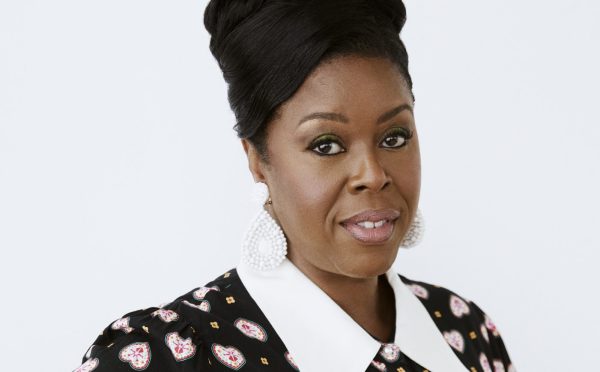
Michelle Greenidge has starred in some of the most talked-about television shows of the decade. It’s A Sin, I May Destroy You, After Life, and now Doctor Who are some of the standouts on her growing CV.
If viewers have watched her command the screen in these shows and wondered why they hadn’t seen her before now, the reason is Michelle didn’t become an actor until she was approaching her 40th birthday.
Her previous career was a world away from the lights and glamour of primetime TV. Joining Southwark Council in London when she was 16 years old, Michelle helped people through some of the worst moments of their lives and gained the kind of life experience that she says has shaped her into the actor and person she has become.
She said: “I spent time working with homeless people. I worked as a lay advocate in court, where you had families about to lose their homes because they were in mortgage arrears, so I would meet them very quickly in the reception area and try to work out a plan with them to add some money to their payments, and I’d go in and speak to the judge on their behalf to try to get a stay. I worked in the High Court. I did surveillance. I interviewed people under caution. I investigated client and staff fraud in the borough.
“It really helped me and shaped me; I would not change it for the world. I feel blessed that I didn’t go down the drama school route, because I feel working in local government was an amazing learning ground for becoming an actor, because it taught me about people from every walk of life, and the highs and lows they go through.
“I’m able to draw on that when performing various roles. I’m hugely grateful for it, because when I walk in the shoes of a character, I want to feel it and not just play it.”
Doctor Who’s Carla Sunday
This is the case for Michelle’s latest role, in the new series of Doctor Who, which began last night. She plays Carla Sunday, foster mum of Ruby, the Doctor’s new assistant. Debuting in the Christmas episode, Carla has fostered 33 kids over the years.
“I adore the character,” Michelle said. “I think we need to see more of these families on our screens, because they play a huge, important part in society and there aren’t enough adopted and fostered families on TV. Thanks go to Russell T Davies, who has written the storyline with so much heart, consideration, care and love.
“I love Carla Sunday and I feel blessed and honoured to have the opportunity to showcase positive representation of fostering and adopting families, and of their bonds and relationships.”
Despite filming the series last year, Michelle says being part of the franchise still doesn’t feel real.
“It’s not sunk in yet,” she smiled. “It’s such a big deal to be part of such a long-running, iconic show, and the fans have been incredibly kind and supportive.
“Everybody in the cast and crew were lovely and it felt like a family reunion. Ncuti Gatwa is just incredible. In the Christmas episode, I did some tough scenes with him that were about loss. Playing opposite him was special for me, and I got to see how fine an actor he is. He is very talented and seeing that up close was great.”
Michelle was able to call on her experiences with Southwark Council to play the role.
“Social services was one of the organisations I worked closely with, and some of the clients were from fostered and adopted families, so I was privy to their journeys, how it impacted them, and what support they needed to take them forward, and I was able to draw on that knowledge.”
While she didn’t become an actor until later, it had always been Michelle’s dream.
“It was what I wanted to do when I was at school. I drew inspiration from my wonderful secondary school teacher, Trudie Goodwin, who left Peckham School to have a long career as Sergeant June Ackland in The Bill. She was my initial inspiration and I’m happy to say we’re still friends.
“When I was growing up, being an actor wasn’t something that was realistic or achievable for someone like me. You know, there weren’t many black faces on TV. I remember asking my parents if I could take drama as an option, and my mum said, ‘Drama? I’m gonna give you drama’, in her Jamaican accent. I can laugh about it now. They were being protective and wanted me to have a stable career with security.”
Acting beginnings
While working at the council, a colleague attended an acting course at Morley College in London and raved about it, so Michelle enrolled too.
“I did it in the evenings and weekends, and I was shattered because I was still working full-time, but my teacher, Craig Snelling, changed my life and I’m so grateful to him.”
Michelle completed the course but didn’t leave her council job for a further nine years, juggling her two careers.
“While I was working for the council, one of my first jobs as an actor was to go into another council to do corporate roleplay,” she explained. “So many organisations – police, fire service, NHS, banks – use actors for roleplay, either for training or for learning and development or recruitment.
“I did that for quite a long time before I left the council, but the TV and film roles didn’t start until I was in my 40s.
“I was scared because I had 20 years of a regular income and now I was leaving to pursue a new career. I sometimes sit on set and can’t believe I’m here. This will never be the norm for me because for 20 years I did something else. I’ll never take any of it for granted.”
Michelle learned a lot working with the council, and that openness to education has continued with her new profession.
“I’ve worked with some phenomenal people, from playing Lola with Diane Morgan in Mandy to Mrs Manning in Steve McQueen’s Small Axe, and as Valerie in Ricky Gervais’ After Life to Grace Arabella, who was Michaela Coel’s on-screen mum in I Must Destroy You.
“In the same year I did It’s A Sin, I also did I May Destroy You, Adult Material and Small Axe, and they were all nominated for a number of awards hot on the heels of one another.
“It was an honour to have had roles in each of them.”
The choice roles don’t look to be slowing down for Michelle. As well as Doctor Who, she’ll soon be seen in the TV adaptation of Candice Carty-Williams’ bestseller Queenie as well as in new Netflix series Kaos, starring Jeff Goldblum.
“Queenie comes out on June 4 on Channel 4 and Disney, and I’m one of the leads in it. Candice is a phenomenal writer and showrunner – she was so supportive and was there every day. Then there is Kaos. Both of those are going to be jaw dropping and epic. I also have a couple of other things I can’t talk about at the moment.”
Michelle added: “I’m having the best time. I’m living the dream – from working with the council to Doctor Who. Sometimes I think to myself, this Peckham girl has done all right.”
Crazy days on sitcom Mandy
One of the best-loved series Michelle has starred in is also the craziest.
She plays the long-suffering and wonderfully named Lola Okonedo Akimbo, the best – and only – pal of Mandy Carter in the BBC comedy Mandy.
Written, directed and starring Philomena Cunk and Motherland star Diane Morgan, the series follows the title character, a hapless and jobless heroine who has big dreams but little motivation to follow them through.
Each 15-minute episode sees Mandy lazily embark on a new scheme that usually ends in disaster for everyone but her.
Guest stars on the show are as unlikely and varied as the stories, with Shaun Ryder, the late Sean Lock, John Cooper Clarke, Johnny Vegas, Deborah Meaden, Konnie Huq, Alexei Sayle, Tom Courtenay, Graham Norton, Michaela Strachan, Aled Jones, Linda Lusardi and Alan Yentob just some of the celebrities joining in.
“It’s bonkers, isn’t it?” Michelle laughed. “I love Diane Morgan. We have a blazing time and we laugh a lot. It’s complete chill working with her and it doesn’t feel like work.
“I’ve been posting behind the scenes videos on my Instagram and you can see we cry with laughter. I don’t know how we manage to shoot anything, we laugh so much.”

Enjoy the convenience of having The Sunday Post delivered as a digital ePaper straight to your smartphone, tablet or computer.
Subscribe for only £5.49 a month and enjoy all the benefits of the printed paper as a digital replica.
Subscribe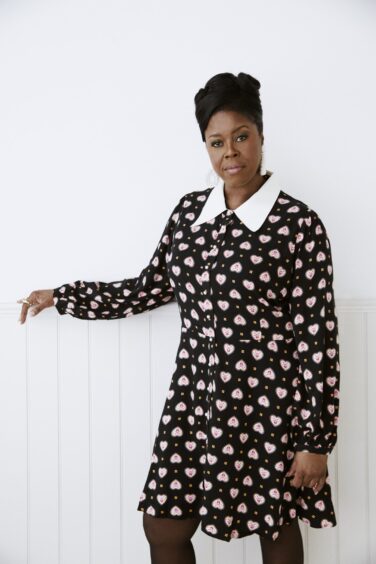
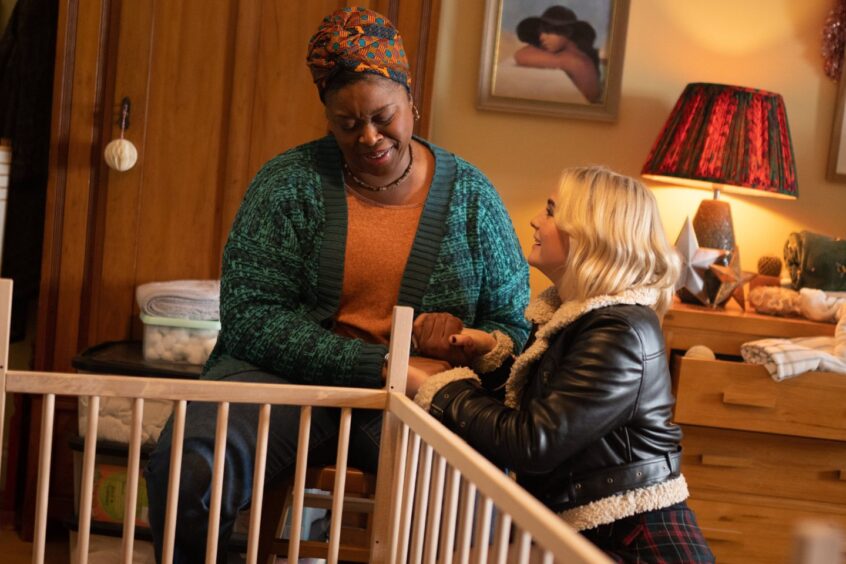 © James Pardon/Bad Wolf/BBC Studios
© James Pardon/Bad Wolf/BBC Studios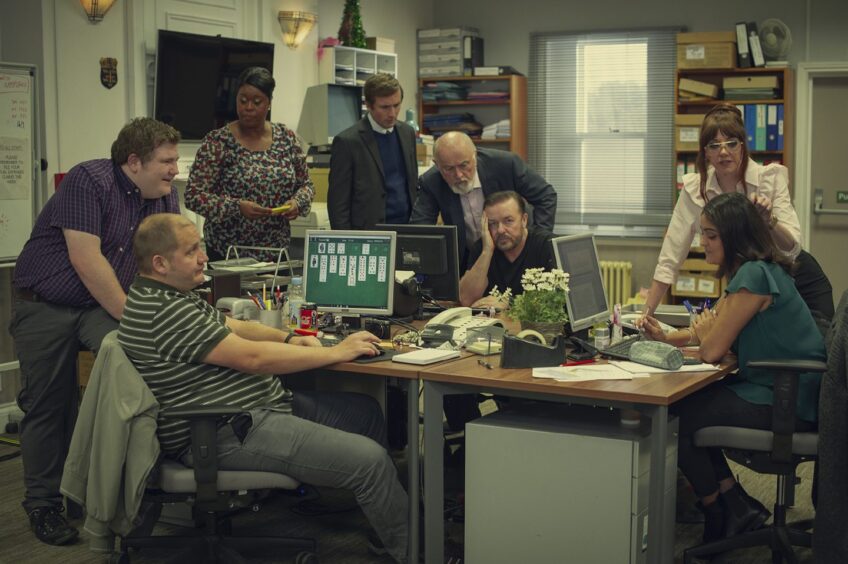
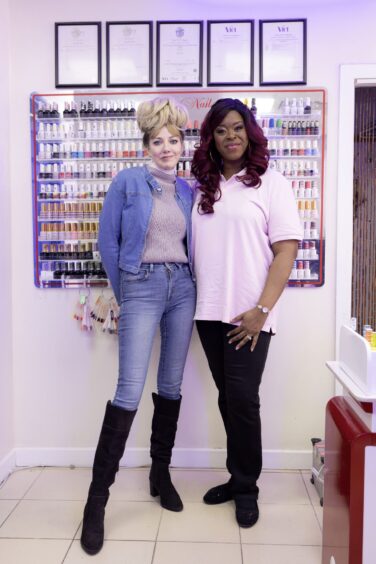 © BBC/Richard Harrison
© BBC/Richard Harrison